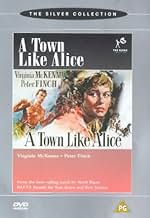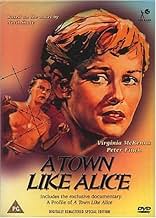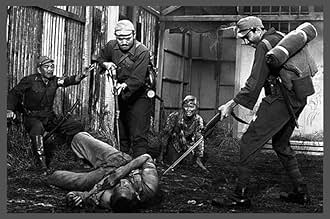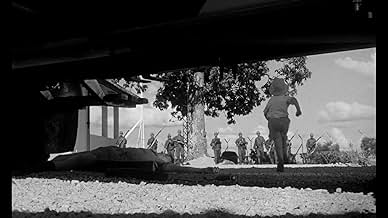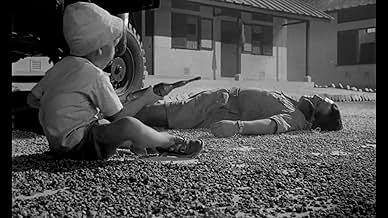IMDb RATING
7.2/10
2.1K
YOUR RATING
A newly wealthy English woman returns to Malaya to build a well for the villagers who helped her during war. Thinking back, she recalls the Australian man who made a great sacrifice to aid h... Read allA newly wealthy English woman returns to Malaya to build a well for the villagers who helped her during war. Thinking back, she recalls the Australian man who made a great sacrifice to aid her and her fellow prisoners of war.A newly wealthy English woman returns to Malaya to build a well for the villagers who helped her during war. Thinking back, she recalls the Australian man who made a great sacrifice to aid her and her fellow prisoners of war.
- Director
- Writers
- Stars
- Won 2 BAFTA Awards
- 2 wins & 5 nominations total
Kenji Takaki
- Japanese Sergeant
- (as Takagi)
Munesato Yamada
- Captain Takata
- (as Yamada)
Otokichi Ikeda
- Kempetei Sergeant
- (as Ikeda)
- Director
- Writers
- All cast & crew
- Production, box office & more at IMDbPro
7.22.1K
1
2
3
4
5
6
7
8
9
10
Featured reviews
An often overlooked subject in WWII films
I have just posted a comment on "Merry Christmas Mr Lawrence" directed by Nagisa Oshima in the early 1980s. The main originality of MCML does not lie in its subject, as other films have dealt with Prisoner-of-War camps under the Japanese rule, the most famous of them remaining "The Bridge on the River Kwai" by David Lean (1957). As MCML is a much more recent film, it might be considered as a more realistic approach to the daily life in a camp under such circumstances; yet realistic films on this subject appeared as early as in the 1950s with works like "A Town like Alice" directed by Jack Lee, which was rejected in its time by the Cannes Film Festival for its shocking content and violence a sharp contrast with often romanticized productions where war has a glamorous aspect. "A Town like Alice" is also original for it tells war from the point of view of women, and women in conflicts are often ignored by war movies.
It has been years now since I watched "A Town like Alice". I remember it as a good and honest film about the conflict with the Japanese in the Far East. Virginia McKenna as a British nurse and Peter Finch were both convincing. It may be not the best film on WWII, yet it has an authenticity and favors a psychological and realistic approach to the characters than can attract many viewers, not just war movies freaks.
By the way, the title is a reference to the town of Alice Springs, where the story ends.
It has been years now since I watched "A Town like Alice". I remember it as a good and honest film about the conflict with the Japanese in the Far East. Virginia McKenna as a British nurse and Peter Finch were both convincing. It may be not the best film on WWII, yet it has an authenticity and favors a psychological and realistic approach to the characters than can attract many viewers, not just war movies freaks.
By the way, the title is a reference to the town of Alice Springs, where the story ends.
A gutsy and gut wrenching 1950s low budget movie about WWII in Malaysia
A Town Like Alice (1956)
A remarkable movie, completely under everyone's radar, about a group of English women in Asia during World War II. They suffer under the hands of the Japanese not as prisoners, quite, but as refugees caught between captors. Having nowhere to go and no one to protect them, they end up walking and walking, through jungle and no-man's land, past actual POW camps and through native villages, until gradually they start to die from the hardship.
Mixed into this really vivid and heartbreaking drama is a love affair between a passing Australian soldier and one of the women. The man is a prisoner of the Japanese who seems to have some freedom because he can fix things for them, and he crosses paths with the women a few times over the years.
Years, yes. The movie moves quickly through a long period of war. This is the real war for most people, the occupation by the Japanese and their arrogance, and the patience and impotence of ordinary people. It is told with alarming frankness. I mean, it's still a movie from the 1950s, not a documentary, but the plainness of the actors, the relatively low budget of the film, and the location shooting all make for a convincing final product. It's amazing, at times, and heartwarming as much as heartwrenching. There is even the one terribly good Japanese soldier trapped by the same bigger circumstance of a war that was not his doing.
The one known actor here is Peter Finch, who is marvelous, even though his role is limited. He is meant to be a bright spot in the life of this woman, and he is wonderfully bright and cheerful (a true Aussie stereotype that we all love).
The book that inspired the movie is widely regarded to this day, and was written by Nevil Shute, who heard about a group of Dutch (not English) women shuttled about by the Japanese in Dutch Malaysia during the war. It turns out that they were not usually made to walk, but Shute's misunderstanding of the story led to the main drama of the book and later movie. The crucifixion of prisoners by Japanese soldiers (shown in the movie) is substantiated, however, and it's a gruesome final turn of events for the plot.
There are few movies of this post-war period that really deal with ordinary suffering by ordinary people in Asia during the war (the suffering of civilians in Europe or Britain is fully shown, by contrast). This one does it well, very well. A wonderful surprise.
A remarkable movie, completely under everyone's radar, about a group of English women in Asia during World War II. They suffer under the hands of the Japanese not as prisoners, quite, but as refugees caught between captors. Having nowhere to go and no one to protect them, they end up walking and walking, through jungle and no-man's land, past actual POW camps and through native villages, until gradually they start to die from the hardship.
Mixed into this really vivid and heartbreaking drama is a love affair between a passing Australian soldier and one of the women. The man is a prisoner of the Japanese who seems to have some freedom because he can fix things for them, and he crosses paths with the women a few times over the years.
Years, yes. The movie moves quickly through a long period of war. This is the real war for most people, the occupation by the Japanese and their arrogance, and the patience and impotence of ordinary people. It is told with alarming frankness. I mean, it's still a movie from the 1950s, not a documentary, but the plainness of the actors, the relatively low budget of the film, and the location shooting all make for a convincing final product. It's amazing, at times, and heartwarming as much as heartwrenching. There is even the one terribly good Japanese soldier trapped by the same bigger circumstance of a war that was not his doing.
The one known actor here is Peter Finch, who is marvelous, even though his role is limited. He is meant to be a bright spot in the life of this woman, and he is wonderfully bright and cheerful (a true Aussie stereotype that we all love).
The book that inspired the movie is widely regarded to this day, and was written by Nevil Shute, who heard about a group of Dutch (not English) women shuttled about by the Japanese in Dutch Malaysia during the war. It turns out that they were not usually made to walk, but Shute's misunderstanding of the story led to the main drama of the book and later movie. The crucifixion of prisoners by Japanese soldiers (shown in the movie) is substantiated, however, and it's a gruesome final turn of events for the plot.
There are few movies of this post-war period that really deal with ordinary suffering by ordinary people in Asia during the war (the suffering of civilians in Europe or Britain is fully shown, by contrast). This one does it well, very well. A wonderful surprise.
The long road to walk
I remember my mother and my aunt watching this film when I was a little boy late once night when it came on television.
They seemed to have cried most of the way through the film. This is an image that sticks in my mind whenever this film is mentioned.
Years later my mother told me how she lost some relatives in the second world war as they tried to escape from the Japanese in Burma by trying to walk it to India. They apparently died of exhaustion
A Town Like Alice adapted from the novel by Nevile Shute looks at a group of women as they shuffle from one Japanese camp to another during occupied Malaysia but no one would take them in. Slowly one by one they perish because of malnutrition, sickness, disease or exhaustion.
During their journey they are accompanied by an old guard who slowly comes to respect them.
During the journey Virginia McKenna meets Australian soldier Peter Finch also a prisoner of war but he does his best to help them out here and there and both fall for each other. However he faces severe punishment when he is found out for stealing some chickens.
The film is told in flashback as McKenna goes back to Malaysia after the war and discovers what happened to Finch.
This is a gritty and unromanticised view of life in occupied Far East, many years before films like Empire of the Sun. Also it is unusual for not being set in a prisoner of war camp, these people want to get there and stay there.
It was filmed in Malaysia and Australia for added authenticity.
Look out for Jean Anderson, many years later she appeared in the BBC television series Tenko which was also women held in a prisoner of war camp in Malaysia.
They seemed to have cried most of the way through the film. This is an image that sticks in my mind whenever this film is mentioned.
Years later my mother told me how she lost some relatives in the second world war as they tried to escape from the Japanese in Burma by trying to walk it to India. They apparently died of exhaustion
A Town Like Alice adapted from the novel by Nevile Shute looks at a group of women as they shuffle from one Japanese camp to another during occupied Malaysia but no one would take them in. Slowly one by one they perish because of malnutrition, sickness, disease or exhaustion.
During their journey they are accompanied by an old guard who slowly comes to respect them.
During the journey Virginia McKenna meets Australian soldier Peter Finch also a prisoner of war but he does his best to help them out here and there and both fall for each other. However he faces severe punishment when he is found out for stealing some chickens.
The film is told in flashback as McKenna goes back to Malaysia after the war and discovers what happened to Finch.
This is a gritty and unromanticised view of life in occupied Far East, many years before films like Empire of the Sun. Also it is unusual for not being set in a prisoner of war camp, these people want to get there and stay there.
It was filmed in Malaysia and Australia for added authenticity.
Look out for Jean Anderson, many years later she appeared in the BBC television series Tenko which was also women held in a prisoner of war camp in Malaysia.
World War Two experience from a different perspective...
Soon after the end of real hostilities in 1945, Hollywood produced the first of many subsequent films from the perspective of prisoners of war held by the Japanese: that film was Three Came Home (1950) with Claudette Colbert. I recall seeing that one a long time ago and recall the dark nature of that narrative (I have yet to submit a review here, but I will, in time).
A Town Like Alice is a different kettle of fish, so to speak: instead of a single family, it's a mix of various women and children caught up in the retreat to Singapore in 1941, and follows their seemingly unending trek across Malaya, from camp to camp, seeking admission and a final resting place to wait out the war.
The black and white photography is superb as the downtrodden party weaves its way through swamp, dirt roads, wet and dry season, very little food or water, malaria, dysentery and all other manner of tropical diseases. Little wonder that, as they walk, they also die, one at a time, from malnutrition and sickness, and all the while, their guard, an old-timer, gradually comes to admire their perseverance just as the women come to respect the old man's quiet determination to keep helping them to survive. That's the main story.
The big sub-plot is how Jean Paget (Virginia McKenna) meets Joe Harmon (Peter Finch), also a prisoner of war, and how they both come to fall in love on the run, if you know what I mean: they keep meeting (he is pressed into service as a driver for the Japanese) at different parts of Malaya as the women keep wandering around, looking for a place to stay. So, there is a bit of comedy from the irrepressible Aussie soldiers, mixed with moments of real tension as the two lovers try to keep a relationship going under such conditions. And, it's during one of those meetings that Jean learns that Joe comes from Alice Springs.
Never boring, and with stand-out scenes, such as one of the little boys running in between the advancing Japanese soldiers with his toy gun, shouting "bang, bang" (reminiscent of Brandon de Wilde in Shane [1953], doing the same thing, and annoying Jean Arthur, inside the farm house); the joy of the women when they come across an abandoned house with hot running water; and, Jean's bargaining with a Malay shop-keeper for tinned milk for a baby.
If this period in history is of interest, you could do worse to spend two hours of your time. And, as for how the romance turns out, well, you'll just have to see the movie, won't you?
A Town Like Alice is a different kettle of fish, so to speak: instead of a single family, it's a mix of various women and children caught up in the retreat to Singapore in 1941, and follows their seemingly unending trek across Malaya, from camp to camp, seeking admission and a final resting place to wait out the war.
The black and white photography is superb as the downtrodden party weaves its way through swamp, dirt roads, wet and dry season, very little food or water, malaria, dysentery and all other manner of tropical diseases. Little wonder that, as they walk, they also die, one at a time, from malnutrition and sickness, and all the while, their guard, an old-timer, gradually comes to admire their perseverance just as the women come to respect the old man's quiet determination to keep helping them to survive. That's the main story.
The big sub-plot is how Jean Paget (Virginia McKenna) meets Joe Harmon (Peter Finch), also a prisoner of war, and how they both come to fall in love on the run, if you know what I mean: they keep meeting (he is pressed into service as a driver for the Japanese) at different parts of Malaya as the women keep wandering around, looking for a place to stay. So, there is a bit of comedy from the irrepressible Aussie soldiers, mixed with moments of real tension as the two lovers try to keep a relationship going under such conditions. And, it's during one of those meetings that Jean learns that Joe comes from Alice Springs.
Never boring, and with stand-out scenes, such as one of the little boys running in between the advancing Japanese soldiers with his toy gun, shouting "bang, bang" (reminiscent of Brandon de Wilde in Shane [1953], doing the same thing, and annoying Jean Arthur, inside the farm house); the joy of the women when they come across an abandoned house with hot running water; and, Jean's bargaining with a Malay shop-keeper for tinned milk for a baby.
If this period in history is of interest, you could do worse to spend two hours of your time. And, as for how the romance turns out, well, you'll just have to see the movie, won't you?
Real Life!
This film is in the same league as the series Tenko for it's realism. I have also watched the mini series which could have it's moments too but the film wins because of the fact that it was made around a decade after it had happened, when things must have been quite fresh in everyones minds. These women were taken captive as the men were but they were not wanted by anyone. These women were far away from home with no clothes apart from what they stood up in, no money and they didn't speak the language. Given those fact the thoughts are so scary!
Did you know
- TriviaAccording to the book 'The Golden Gong---Fifty years of the Rank Organisation, its films and its stars' by Quentin Falk, "While at premiere of a Disney film, 'Robin Hood' [See: The Story of Robin Hood and His Merrie Men (1952)], he [Earl St. John] was particularly impressed by the young man who played the Sheriff of Nottingham. The name on the programme was that of Peter Finch. St. John bumped into Finch on the stairs of the theatre and invited him to come and talk business at Pinewood. Next day he gave Finch what would be a pivotal role in his burgeoning career: the Australian soldier, Joe, in A Town Like Alice (1956).
- GoofsHarry Corbett bought his Sooty puppet from a regular store---he didn't design or create it as such. It's possible therefore that Freddie might have had the same puppet before Harry Corbett gave it national fame.
- Quotes
[repeated line]
Japanese Sergeant: Japanese women walk!
- Crazy creditsOPENING CREDITS PROLOGUE: "The characters in this story are fictitious. The story itself however is based upon true fact."
- ConnectionsFeatured in A Profile of 'A Town Like Alice' (2001)
- How long is A Town Like Alice?Powered by Alexa
Details
- Release date
- Country of origin
- Languages
- Also known as
- The Rape of Malaya
- Filming locations
- Kuala Lumpur, Malaysia(establishing shot of British Government Offices - now the Sultan Abdul Samad Building)
- Production companies
- See more company credits at IMDbPro
- Runtime
- 1h 57m(117 min)
- Color
- Aspect ratio
- 1.66 : 1
Contribute to this page
Suggest an edit or add missing content


